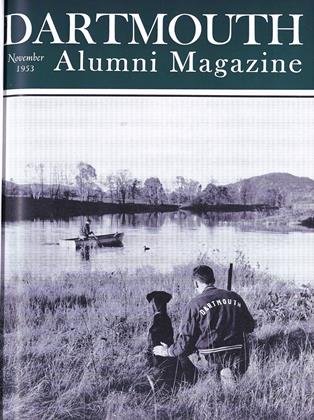"When the wind blows over 100 miles an hour, you can't stand up. You crawl along with it screaming in your ears. Your mind seems to work slowly. There is no time for panic, but you realize that you are skidding along with the wind like a crab. You know dimly where you should be and you try to calculate your drift
"Finally," he said, "we lost communication completely. Although we couldn't speak, all of us scattered around that summit were thinking the same thing what darn fools we were to be caught like that on the top of a mountain in midwinter, with no rope and our lives there for the taking."
Telling about that day on Moosilauke, Larry Taylor '54 leans toward you from his chair, hunching his shoulders. Eyes narrowed against the wind and snow, he gestures violently and his fingers claw for holds as he describes how six students were blown off the summit.
Larry is from East Orange, N. J., where his father, an M.I.T. man, is with Western Electric. Adventure is old stuff for Larry who had his share of it on a bicycle each day as he zig-zagged his way through traffic to Newark Academy. The school is right in Newark but "has enough grass for football" and Larry speaks about it enthusiastically although summers spent in New Hampshire made his city life uncomfortable. His father, a long-time member of the Appalachian Mountain Club, started the family interest in the out-of-doors.
Larry spent most o£ his spare time during freshman year at Dartmouth with WDBS, the student radio station, where his interest in classical music prepared him to work into the job o£ directing the Ford Concert Hour and the Masterworks in Music series. Now, in his senior year, he gives "full time" to the Dartmouth Outing Club and is one of its leaders as Director of Cabin and Trail which, among other things, is responsible for the maintenance of the Club's seventeen cabins and over too miles of trails.
Winter had been a relatively inactive time for C & T until a few years ago when a group started winter camping, first as a novelty and then with determination to learn how to be safe and comfortable, despite the elements. A number of experts were on the campus to help and it wasn't long before an organized Cold Weather Program was started. A.s head man of C & T, Larry is in charge of the program's informal lectures and demonstrations.
Last year, the College officially recognized the widespread interest in the North by announcing the Program of Northern Studies. The Arctic Seminar, which brings together about fifteen students with a common interest in the North, and the practical DOC work and well-spent summers make up the present activity of the Northern Studies Program.
In the summer of 1952, Larry worked at the Thule, Greenland weather station on the edge of the Polar ice cap. Last summer he made good use of what has been learned in his Geology major with the U. S. Geological Survey in the Aleutians, travelling from island to island on an 86 foot fishing vessel that had a beam of 15 feet. "On a ship like that on the Bering Sea, you really get seasick!"
You get to know the Bering Sea only by wallowing in it, Larry would say; you learn to live in the North only by rolling a sleeping bag at 40-below and, although it's definitely doing it the hard way, the boys on Moosilauke that day learned lessons they will never forget.
Last February they were lucky, next time they won't need luck. At least that's what they pledged over hot tea and deviled ham sandwiches once they got to safety in the Undergrad Cabin, well below timberline. Larry is now making plans for practice rescue operations should others get into similar trouble. When he tells a rescue crew about the difficulties of getting about in a 100 mph wind, his words have the command of authenticity but his eyes say that he really wouldn't mind doing it all over again.
After a hitch in the Army, Larry hopes to continue his geology work in graduate school, perhaps McGill, and then follow the arrow on the compass to what many call our last great frontier.
LAWRENCE D. TAYLOR '54
 View Full Issue
View Full Issue
More From This Issue
-
 Article
ArticleMore Scholarships
November 1953 By ROBERT L. ALLEN '45 -
 Article
ArticleThe Measure of Maturity
November 1953 -
 Class Notes
Class Notes1918
November 1953 By ERNEST H. FARLEY, W. CURTIS GLOVER, RICHARD P. WHITE -
 Article
ArticleThe Faculty
November 1953 By HAROLD L. BOND '42 -
 Class Notes
Class Notes1926
November 1953 By HERBERT H. HARWOOD, H. DONALD NORSTRAND, CARLETON BLUNT -
 Class Notes
Class Notes1916
November 1953 By F. STIRLING WILSON, C. CARLTON COFFIN, H. CLIFFORD BEAN
R. L. A.
-
 Article
ArticleHe's Got the Stuff
June 1952 By R. L. A. -
 Article
ArticleThe Dartmouth
November 1952 By R. L. A. -
 Article
Article"The Hershey Kid"
December 1953 By R. L. A. -
 Article
ArticleTrojan Horse
November 1956 By R. L. A. -
 Feature
FeatureTo Make What's Good Better
February 1951 By R. L. A. -
 Article
ArticleSinging Manager
March 1957 By R. L. A.







